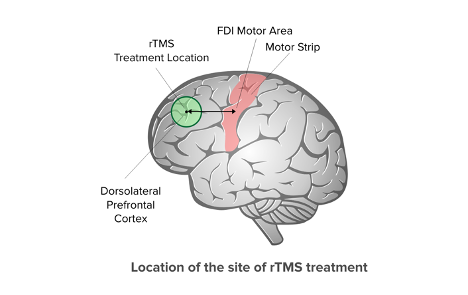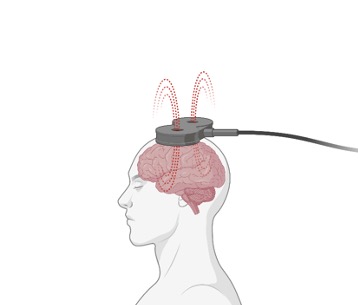

Our program offers treatment in the form of repetitive transcranial magnetic stimulation, or rTMS, for individuals with major depressive disorder who have failed one or more pharmacological therapies in the past. rTMS is a non-invasive form of brain stimulation which has been approved by Health Canada for the treatment of major depressive disorder. It works by directly stimulating specific areas of the brain using focused magnetic field pulses that are applied using a magnetic coil placed against the head. These pulses stimulate specific parts of the brain and are applied repeatedly to strengthen or weaken connections within the brain, leading to long-lasting changes in brain activity. This change is known to reverse unhealthy and abnormal patterns of brain activity that are associated with major depression.
Questions
rTMS is a Health Canada approved treatment for major depression. It is also being studied for use in other mental health conditions, such as bipolar affective disorder, generalized anxiety disorder, obsessive compulsive disorder, post-traumatic stress disorder, substance use disorders, and eating disorders.
rTMS uses a strong electromagnetic field to directly stimulate specific areas of your brain. These areas are involved in controlling your impulses, thoughts, emotions, and behaviours and may be more or less active in people with depression and mental health disorders.
A magnetic coil is placed against your scalp which will target a specific area of your brain. With repeated treatments, the magnetic pulses change the activity of the brain cells (neurons) and the pathways between brain cells, returning the brain to normal functioning.
A course of rTMS involves approximately 20 to 30 treatment sessions. Sessions will occur daily for 4 to 6 weeks and each session will last 15 to 30 minutes.
The number of treatments you receive will be decided by your psychiatrist.
People who have major depression as well as other mental health disorders are eligible for treatment. rTMS is considered for people who have not benefited from one or more treatment options (such as medication or therapy). rTMS is also considered in patients that cannot tolerate side effects from medications.
The following patients may not be eligible for rTMS treatment:
One third of patients show a significant improvement in their symptoms (up to 80% improvement), one third of patients do not show any benefit from treatment and one third of patients are in the middle, receiving some benefit but requiring other treatments to control their symptoms.
rTMS works best in mood disorders, such as depression. Treatments in other conditions, such as impulse control disorders, are still considered experimental and the efficacy is not as well known.
Most people who receive rTMS experience only mild side effects. The most common side effect is scalp pain during treatment. The sensation is similar to static electricity and can be intense in the beginning. After the first few sessions, the nerves in the scalp adapt to the stimulation and the pain becomes less intense. Other symptoms may include headache or fatigue after treatment. These side effects are transient, and patients can take ibuprofen (Advil) or acetaminophen (Tylenol) 1 to 2 hours before treatment to reduce the pain or headache.
There is also a small chance that rTMS could cause a seizure. Seizure occurs in about 1 out of every 10,000 people who receive rTMS.
People with bipolar disorder may experience a manic switch, where their symptoms of depression turn to mania or hypomania. This is a rare side effect that occurs in less than 1% of patients with bipolar disorder. Our team will monitor patients daily to prevent such a switch.
Side effects will be discussed in more detail at your first appointment. rTMS has been in use since the early 1990s and there have been no known long-term side effects to date.
Our team will monitor for side effects during treatment.
If you are currently taking medication for depression, you do not need to stop taking it before starting rTMS treatment. You should be on a stable dose of the medication for at least 4 weeks prior to starting treatment. However, some medications may block the effects of rTMS and the psychiatrist and physician assistant will discuss these medications at your initial appointment.
It is important that you do not make any changes to your medications during the 4 weeks before treatment and during treatment. Changes to your medication during rTMS treatment would make it difficult to determine if rTMS works for you or not.
You should talk to your doctor if you are taking any of the following medications which in some people may cause the rTMS to be less effective:
No, you do not have to pay for rTMS treatment. While rTMS is not currently covered by OHIP, our clinic has funds that will cover the cost of treatment.
Your treatment will be at St. Michael’s Hospital, located at 30 Bond Street. The clinic is located on the 17th floor of the Cardinal Carter South Wing.
Please arrive 15 minutes early to your appointment and check in at the reception desk located on the 17th floor of the Cardinal Carter South wing. Once you exit the elevators in the Cardinal Carter South Wing, head through the double doors and you will see the reception desk directly in front of you.
We ask that you complete a set of questionnaires that you can pick up from the reception desk. Once completed, you can hand them to the rTMS technician. The daily questionnaires will help you and the doctor track your treatment progress.
Please call the clinic 48 hours in advance if you need to cancel or reschedule the appointment.
You can contact the clinic at: 416-864-5418
No. You can return to your normal daily activities right after the session. There are no driving restrictions after rTMS. If you choose, you may bring a support person to the first few sessions.
Once you finish 20 to 30 sessions of rTMS over 4 to 6 weeks, you will be asked to return to the clinic for 2 to 4 follow-up appointments. The clinic administrative assistant will help you book these appointments.
Your follow-up appointments will be with the psychiatrist or physician assistant. They will monitor your symptoms and help you arrange referrals for follow-up medication or therapy as needed. Some people benefit from a course of therapy after a successful course of rTMS treatment, which will help prevent symptoms from returning. This option can be discussed during a follow-up appointment.
If you are having thoughts of harming yourself at any time, please call the Greater Toronto Distress Centre Helpline 416-408-HELP (4357) or visit your nearest emergency department. In this situation, please do not use the clinic voicemail or email, as it may not be possible to provide an immediate response.